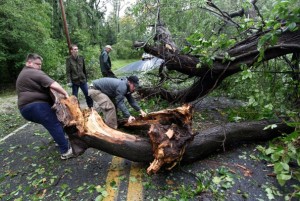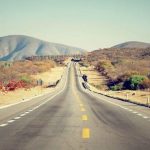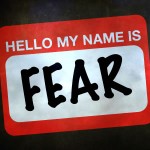From NaturalNews.com | By Mike Adams (The Health Ranger) | On Sunday, July 8th, 2012

(NaturalNews) In the wake of violent storms, the power went out for millions of Americans across several U.S. states. Governors of Virginia, West Virginia and Ohio declared a state of emergency. Over twenty people were confirmed dead, and millions sweltered in blistering temperatures while having no air conditioning or refrigeration. As their frozen foods melted into processed goo, some were waking up to a few lessons that we would all be wise to remember.
Here are 10 hard lessons we’re all learning (or re-learning, as the case may be) from this situation:
#1) The power grid is ridiculously vulnerable to disruptions and failure
All it takes is Mother Nature unleashing a little wind storm, and entire human cities are cut off from their power grid. Wind and trees, in other words, can destroy in seconds what takes humans years to construct. As Newt Gingrich even quipped about the situation, what we witnessed was just a small taste of what a high-altitude EMP weapon attack could unleash across all of North America. (http://www.youtube.com/watch?v=YpuyPfAZRTU)
#2) Without electricity, acquiring food and water in a major U.S. city can become a difficult task
During the outage, masses of people across the Eastern U.S. scrambled to get squared away on food and water. Fortunately for them, malls and gas stations were open, providing (processed) food, water and air conditioning. That’s because the power outages were fragmented, affecting some neighborhoods but not others.
In a total grid down scenario, food and water supplies in a given U.S. city will disappear almost overnight. It’s much the same for gasoline, batteries and even ammunition. All these supplies (and many more) will simply be stripped from the shelves.
#3) Most people are simply not prepared and therefore worsen any crisis
The average American citizen practices zero preparedness. They are 100% dependent on the power grid, the city water supply, 911 services for protection and long-distance food deliveries to their grocery store. They have no backup plans, no stored food, no emergency mindset and no practical skills for surviving a real crisis.
As a result, their lack of preparedness worsens any crisis. Instead of being part of the solution, they become a burden on all the emergency services and supplies available in the area.
Hilariously, today’s city goers actually consider malls and movie theaters to be places of refuge. As FoxNews reported last weekend, “On Saturday, many people flocked to places like malls and movie theaters in the hope the lights would be on again when they returned home.” (http://www.foxnews.com/us/2012/07/01/millions-without-power-brace-for…)
#4) Cell phones are a fragile technology that can’t be counted on in an emergency
One of the more interesting observations about the current crisis is that many cell phone towers are out of service. That’s because they have no electricity and / or they have been damaged by wind or debris.
As a result, people who depend on cell phones for their lifeline to friends, relatives and 911 emergency services were suddenly left with non-functioning devices. Even in areas where the cell phone towers were still operating, many people had no place to charge their phones because their own homes were cut off from electricity.
When the grid is up, and there are no storms, solar flares or disruptions, cell phones are truly amazing devices, but they are vulnerable to even small-scale natural events, and they therefore cannot be relied on when you need them most.
#5) The internet is wildly vulnerable to natural disasters
According to news reports, these storms took down a portion of the Amazon Cloud, and this in turn shut down Netflix, Pinterest and Instagram. Those services have now been restored, but they were offline for several hours during which many of their users no doubt thought the world was coming to an end.
#6) Many people have no clue what to do in an emergency
Consider this quote about the CDC telling people what to do:
“The U.S. Centers of Disease Control and Prevention was among many government agencies trying to keep people informed — from knowing when the food in your suddenly inoperable freezer can’t be eaten to taking a cool bath if you don’t have AC.” (http://www.cnn.com/2012/06/30/us/extreme-heat/index.html)
Seriously? Does the government have to tell people to take a cool bath in order to avoid overheating? Do people not know when food has spoiled? And even more strangely, is it now the role of the U.S. government to tell everybody what to do in every emergency?
Whatever happened to common sense? I can tell you what: It moved out to the country!
Out in the country of Texas, Georgia, Kentucky and just about everywhere else, ranchers and farmers still have common sense. They know about backup water supplies, and they can figure things out for themselves. It seems to be city people who need the most instructions from Washington D.C. because they’ve forgotten the fundamental skills of human survival.
#7) 911 and other emergency services are quickly overwhelmed or completely offline
According to MSNBC:
In Washington’s northern Virginia suburbs, emergency 911 call centers were out of service; residents were told to call local police and fire departments. Huge trees toppled across streets in the nation’s capital, crumpling cars. Cellphone and Internet service was spotty, gas stations shut down and residents were urged to conserve water.
(http://www.msnbc.msn.com/id/48032427/ns/weather/)
#8) A national grid-down situation would be far more complex to repair
The recent storms that caused this “grid down” situation for millions of Americans was a local event, and its repair and restoration was aided by workers arriving from outside the affected regions. In a national grid down scenario, however, there will be no excess human capital to lend to the situation. Every worker will be busy trying to restore the power grid in their own home regions.
This means repairs will take significantly longer, and according to some experts like David Chalk and James Wesley Rawles, a national grid down scenario has the potential of being unable to be repaired at all, resulting in years of no power grid which would obviously cause a mass die-off across the U.S. population.
#9) Modern cities are built on systems that have little redundancy
When the power goes out to a local hospital, there might be a temporary backup generator, but even that generator relies on the delivery of fuel. The delivery of generator fuel, in turn, relies on the availability of diesel truck fuel, which depends on petroleum refineries functioning, which in turn depends on the power grid staying up and highways remaining navigable. This is a complex chain of dependencies which can suffer disruptions or even total failure without warning.
There are surprisingly few redundancies in modern cities: Power, water, 911 services, natural gas and even sewage systems are all vulnerable to single points of failure. Even the evacuation infrastructure of modern cities is ripe for total failure. The city of Los Angeles, for example, simply cannot — under any circumstances — be evacuated. The highways simply do not have the capacity to handle the mass of vehicles attempting to leave, and in less than 72 hours, the whole thing would turn into a giant parking lot of stranded vehicles and desperate people, ripe for the picking off by armed gangs riding motorcycles.
When 911 fails, most people have no backup plan. Most people have no skills to defend themselves against acts of violence. They have no mindset for dealing with difficulty, so they call others to solve their problems for them: the police, the plumber, the fireman, the ambulance and so on. In a collapse scenario, individuals whose specialty skills are currently shared across a broad population will suddenly be difficult or impossible to locate. Why? Because they’ll be at home protecting their families!
#10) Mother Nature will humble humanity
Any time human beings get too arrogant and too big-headed about all their amazing cell phone technology, hi-rise cities and nuclear power plants, Mother Nature just shrugs and sends forth a tsunami of water or wind. All of humanity’s greatest constructs are but fragile toys compared to the truly awesome power of Mother Nature and the resilience of planet Earth.
If the power grid goes down across planet Earth for just one year, 90% of human civilization will perish, and along with it all the DVDs, Nike shoes and designer bling as well. Even the entire fictional construct of society’s laws and banking system will cease to exist.
Mother Nature is real. Consciousness is real. Seeds are real. But much of what humanity has so far created is paper-thin and temporary. It can all cease to exist in the blink of a cosmic eye.
We are fragile beings exploring a sea of such greatness and scale that our own lives seem silly by comparison. What humans think of as a natural “disaster” is but a tiny expression of natural patterns to Mother Nature. If we truly hope to survive as a species, we would be wise to remember how insignificant we really are in the greater scope of things… and why we must learn to respect nature and the universe rather than arrogantly thinking we have conquered it with GMOs, nuclear power and a supercollider.
About the author: Mike Adams is a consumer health advocate and award-winning journalist with a mission to teach personal and planetary health to the public He is a prolific writer and has published thousands of articles, interviews, reports and consumer guides, and he is well known as the creator of popular downloadable preparedness programs on financial collapse, emergency food storage, wilderness survival and home defense skills. Adams is a trusted, independent journalist who receives no money or promotional fees whatsoever to write about other companies’ products. In 2010, Adams launched TV.NaturalNews.com, a natural health video site featuring videos on holistic health and green living. He’s also the CEO of a highly successful email newsletter software company that develops software used to send permission email campaigns to subscribers. Adams volunteers his time to serve as the executive director of the Consumer Wellness Center, a 501(c)3 non-profit organization, and enjoys outdoor activities, nature photography, Pilates and martial arts training. Known as the ‘Health Ranger,’ Adams’ personal health statistics and mission statements are located at www.HealthRanger.org
This article was originally posted at: http://www.naturalnews.com/036406_power_grid_failure_lessons.html







